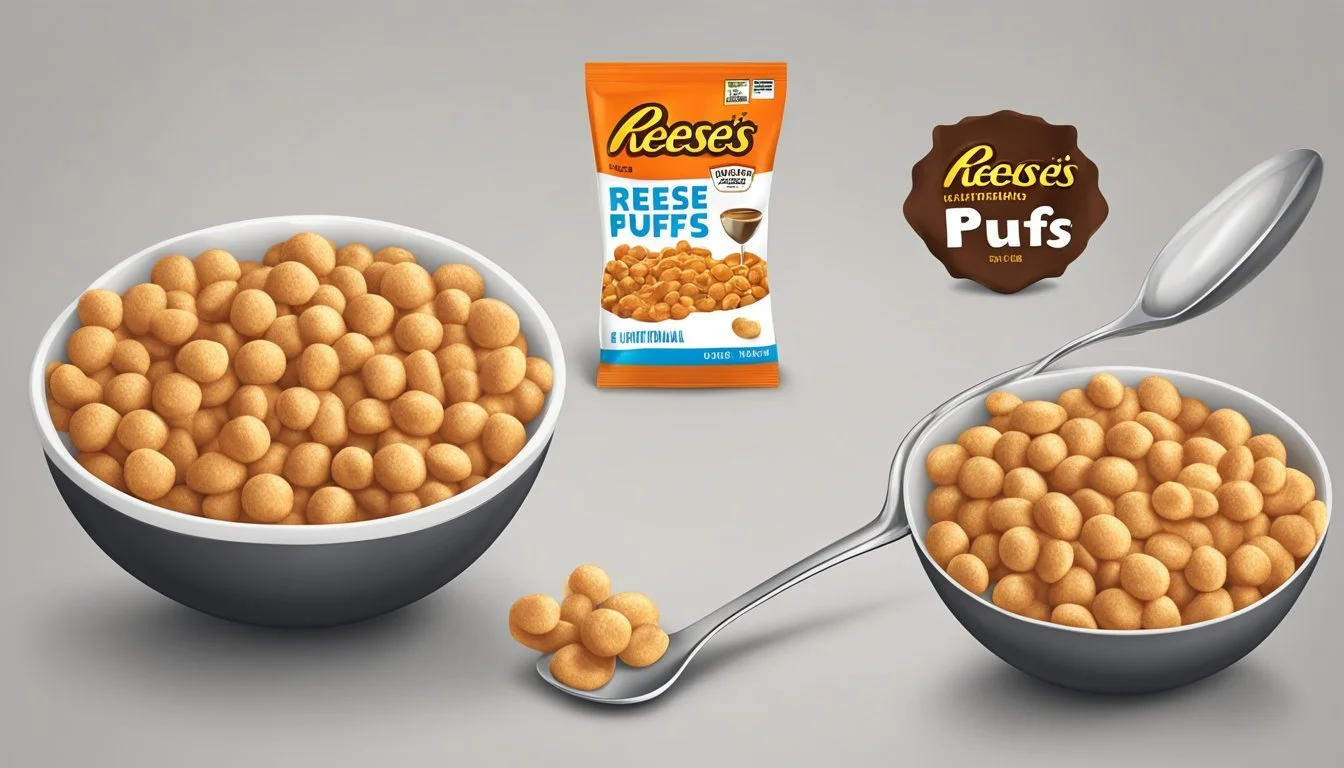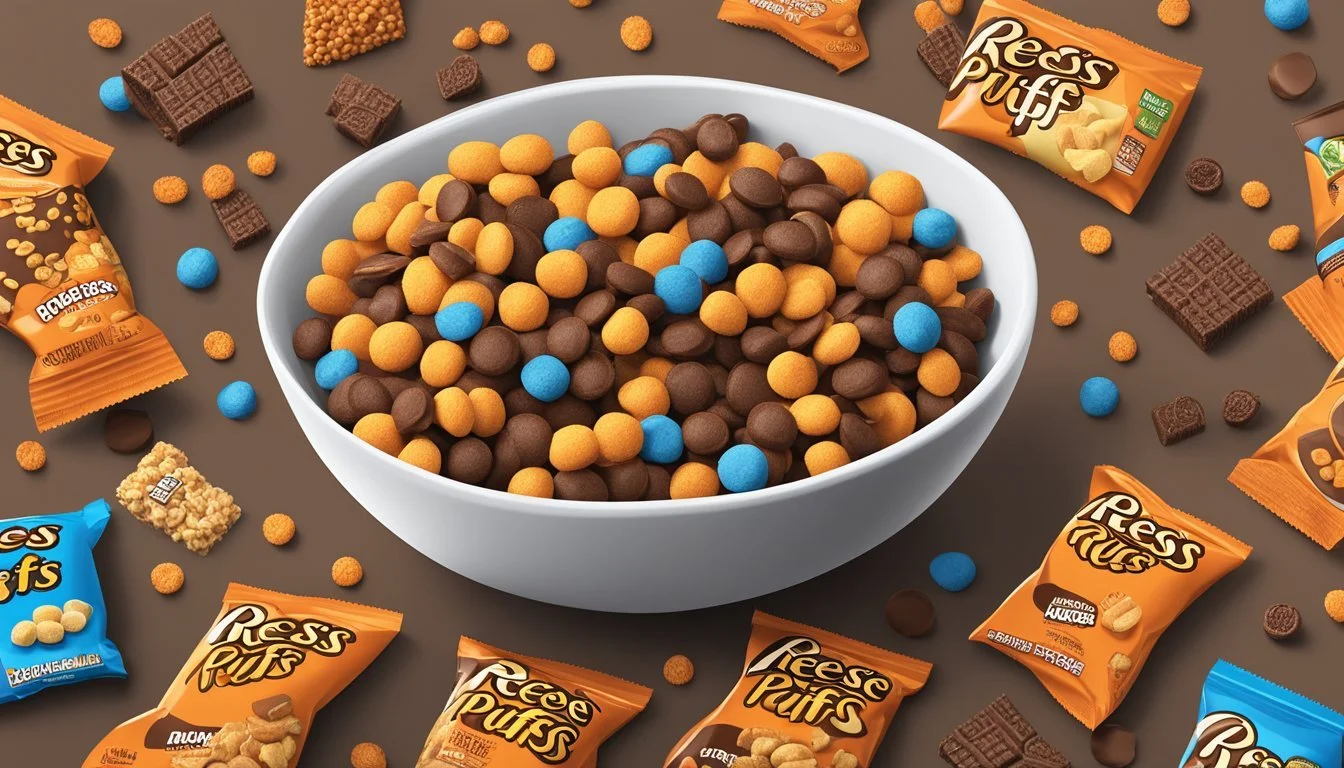Reese's Puffs Treats Nutrition Facts & More
Analyzing the Sweet and Crunchy Snack
Reese's Puffs Treats offer a sweet and convenient snack option for peanut butter and chocolate lovers. These cereal bars combine the iconic flavor of Reese's Puffs cereal with a crispy, portable format.
A single Reese's Puffs Treat bar contains 100-110 calories, with 30% of calories from fat, 62% from carbohydrates, and 8% from protein. This nutritional profile reflects the treat's composition of whole grain corn, sugar, peanut butter, and cocoa.
While Reese's Puffs Treats provide a quick energy boost, they are considered a processed snack food. The ingredient list includes added sugars and artificial flavors, which contribute to their sweet taste but may not align with all dietary preferences.
Reese's Puffs Treats Overview
Reese's Puffs Treats are a popular snack made from Reese's Puffs cereal. These treats combine the beloved chocolate and peanut butter flavors of the cereal into a convenient bar form.
General Mills, the maker of Reese's Puffs cereal, offers these treats as a portable snack option. The treats typically contain Reese's Puffs cereal, marshmallows, and butter.
To make Reese's Puffs Treats at home, one can follow a simple recipe:
Melt butter and marshmallows
Mix in Reese's Puffs cereal
Press into a pan and let set
The resulting treats offer a sweet and satisfying snack with a familiar taste profile. They provide a crunchy texture from the cereal combined with a chewy marshmallow base.
Reese's Puffs Treats can be cut into squares or bars for easy serving. They make a quick dessert option or on-the-go snack for both children and adults.
While enjoyable, it's important to note that these treats are high in sugar and should be consumed in moderation as part of a balanced diet.
Nutritional Profile
Reese's Puffs Treats offer a mix of macronutrients and micronutrients typical of sweet cereal bars. They provide quick energy but are relatively high in sugar and low in essential nutrients.
Macronutrients
A single Reese's Puffs Treat bar (24g) contains 100-110 calories. The macronutrient breakdown is approximately 30% fat, 62% carbohydrates, and 8% protein. Each bar provides about 3.5g of total fat, including some saturated fat. The carbohydrate content is around 16g per bar, with a significant portion coming from sugars. Protein content is relatively low at 2g per serving.
The bars are made with whole grain corn as the first ingredient, followed by sugar and Reese's peanut butter. They also contain corn syrup, canola oil, and cocoa.
Micronutrients
Reese's Puffs Treats contain small amounts of various micronutrients. They are fortified with some vitamins and minerals, including calcium and iron. However, the quantities of these nutrients are generally low compared to daily recommended values.
Sodium content is present but moderate. The treats do not provide significant amounts of dietary fiber, vitamin D, or potassium. As processed snack items, they are not a rich source of essential vitamins and minerals found in whole foods.
Serving Size and Portions
Reese's Puffs Treats come in convenient bar form. The standard serving size is one bar, weighing approximately 24 grams.
This single-bar serving contains 100-110 calories, depending on the specific product variation. The compact size makes portion control easier for consumers.
It's important to note that individual nutritional needs vary. The recommended daily calorie intake differs based on factors like age, sex, weight, and activity level.
For context, a 24-gram Reese's Puffs Treat represents about 5-6% of a 2000-calorie diet. This assumes the treat provides 100-110 calories per serving.
Consumers should consider how these treats fit into their overall daily nutritional goals. Balancing indulgences with nutrient-dense foods is key for a well-rounded diet.
Reading nutrition labels can help individuals make informed choices about portion sizes and frequency of consumption. This allows for enjoyment of treats while maintaining dietary balance.
Common Additives
Reese's Puffs Treats contain several additives to enhance flavor, texture, and shelf life. These include various fats and sugars that contribute to the product's taste and nutritional profile.
Types of Fats
Reese's Puffs Treats incorporate different fats in their formulation. Canola oil is a primary fat source, providing a neutral flavor and contributing to the texture. Peanut oil, derived from the peanuts in Reese's Peanut Butter, adds richness and flavor.
The treats contain both monounsaturated and polyunsaturated fats. Monounsaturated fats are present in the peanut and canola oils. Polyunsaturated fats are found in smaller amounts, primarily from the canola oil.
Mixed tocopherols, a form of vitamin E, are added as a preservative. They act as antioxidants, helping to prevent fats from becoming rancid and extending the product's shelf life.
Sugar Content
Sugar plays a significant role in Reese's Puffs Treats' flavor and texture. The product contains multiple forms of added sugars, contributing to its sweet taste and caloric content.
Dextrose, a simple sugar derived from corn, is one of the primary sweeteners. Corn syrup, another form of added sugar, provides additional sweetness and helps bind the cereal pieces together.
The treats also contain sugar in its granulated form, listed simply as "sugar" in the ingredients. This contributes to the overall sweetness and helps create the desired texture.
It's important to note that these added sugars contribute significantly to the product's carbohydrate content. Each 24-gram bar contains approximately 16 grams of carbohydrates, a large portion of which comes from these added sugars.
Diet and Lifestyle
Reese's Puffs Treats present challenges for health-conscious consumers. Their nutritional profile impacts various dietary approaches and lifestyle choices.
Healthy Alternatives
Air-popped popcorn offers a lighter snack option with fewer calories and more dietary fiber. Fruit bars made with whole fruits and minimal added sugars provide natural sweetness and nutrients. Trail mix combining nuts, seeds, and dried fruits delivers protein and healthy fats in controlled portions.
Homemade cereal bars using whole grain oats, natural peanut butter, and dark chocolate chips can mimic Reese's Puffs flavors with improved nutrition. Greek yogurt topped with a small amount of Reese's Puffs adds protein while satisfying cravings.
Dietary Considerations
Reese's Puffs Treats contain gluten from wheat ingredients, making them unsuitable for those with celiac disease or gluten sensitivity. The treats also include milk products, posing issues for individuals with lactose intolerance.
A single Reese's Puffs Treat bar contains approximately 100 calories. This calorie count may fit into some diets when consumed occasionally, but frequent consumption can contribute to excess calorie intake.
The treats' sugar content and processed ingredients make them less ideal for low-carb or whole food diets. Those following strict dietary guidelines may need to avoid these treats entirely or reserve them for rare indulgences.
Comparison with Other Snacks
Reese's Puffs Treats offer a unique snack option, but it's important to consider how they stack up nutritionally against alternatives. Let's examine how these treats compare to other popular snack and cereal choices.
Snack Alternatives
Reese's Puffs Treats contain 100 calories per 24g bar. This is comparable to some other snack options, but differences emerge in nutritional content. A serving of pretzels (28g) typically has around 110 calories but less sugar. Potato chips (28g) often have 150-160 calories and more fat.
Crackers vary widely, with some whole grain options providing similar calories but more fiber. Leather fruit bars can be lower in calories (60-80 per bar) and offer natural fruit sugars.
When comparing fats and carbs, Reese's Puffs Treats have 3.5g of fat and 16g of carbs per bar. This fat content is lower than potato chips but higher than many pretzels or fruit snacks.
Cereal Alternatives
As a cereal-based snack, Reese's Puffs Treats invite comparison with other cereals. Honey Nut Cheerios (28g serving) contain about 110 calories, similar to the treats. However, Cheerios offer more fiber and less sugar.
Rice Chex Cereal (31g serving) provides around 120 calories with less sugar and fat than Reese's Puffs Treats. It also contains more iron and other essential vitamins.
Both these cereals, when consumed as intended with milk, offer more volume for similar calories. This can lead to increased satiety compared to the compact Reese's Puffs Treats bar.
Food databases show that many cereals, including these alternatives, tend to have a more balanced nutritional profile. They often provide more vitamins, minerals, and fiber per serving than the Reese's Puffs Treats.
Branded Snack Options
Reese's Puffs Treats offer a familiar peanut butter and chocolate flavor in a convenient bar format. Several other branded snack options provide alternatives for different tastes and dietary needs.
Popular Picks
Reese's Puffs Treats combine the classic cereal into a portable snack bar. These treats pack 100-110 calories per 24-gram bar. For cheese lovers, Red Lobster Mozzarella Cheesesticks Platter delivers a restaurant-style appetizer at home.
The Good Crisp Company Spicy Cheese Balls offer a zesty twist on a classic snack. These gluten-free puffs provide a satisfying crunch without artificial flavors or preservatives. Country House Mixed Nut Crunch combines various nuts for a protein-rich snack option.
Healthier Choices
RIND Apple Chips present a fruit-based alternative with no added sugar. These chips retain the apple peel for extra nutrients and fiber. Honey Mama's Oregon Mint Cocoa Truffle Bar offers a paleo-friendly treat made with whole food ingredients.
Snap Kitchen Siete Grain Free Churro Strips provide a gluten-free, grain-free option for those with dietary restrictions. These strips offer a cinnamon-sugar flavor without artificial ingredients. Each of these choices caters to different nutritional needs while still delivering satisfying flavors and textures.







